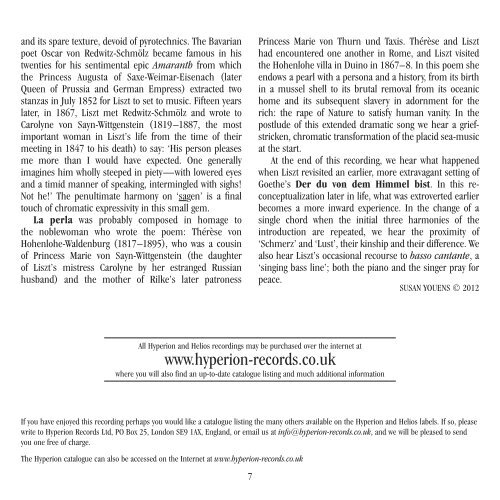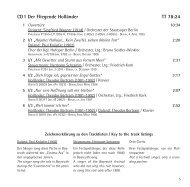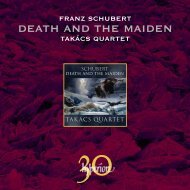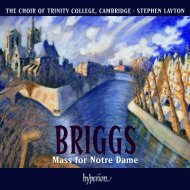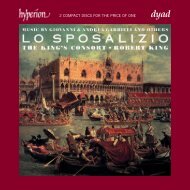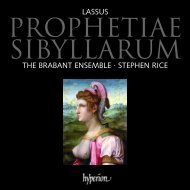Liszt: The Complete Songs, Vol. 2 - Angelika ... - Abeille Musique
Liszt: The Complete Songs, Vol. 2 - Angelika ... - Abeille Musique
Liszt: The Complete Songs, Vol. 2 - Angelika ... - Abeille Musique
Sie wollen auch ein ePaper? Erhöhen Sie die Reichweite Ihrer Titel.
YUMPU macht aus Druck-PDFs automatisch weboptimierte ePaper, die Google liebt.
and its spare texture, devoid of pyrotechnics. <strong>The</strong> Bavarian<br />
poet Oscar von Redwitz-Schmölz became famous in his<br />
twenties for his sentimental epic Amaranth from which<br />
the Princess Augusta of Saxe-Weimar-Eisenach (later<br />
Queen of Prussia and German Empress) extracted two<br />
stanzas in July 1852 for <strong>Liszt</strong> to set to music. Fifteen years<br />
later, in 1867, <strong>Liszt</strong> met Redwitz-Schmölz and wrote to<br />
Carolyne von Sayn-Wittgenstein (1819–1887, the most<br />
important woman in <strong>Liszt</strong>’s life from the time of their<br />
meeting in 1847 to his death) to say: ‘His person pleases<br />
me more than I would have expected. One generally<br />
imagines him wholly steeped in piety—with lowered eyes<br />
and a timid manner of speaking, intermingled with sighs!<br />
Not he!’ <strong>The</strong> penultimate harmony on ‘sagen’ is a final<br />
touch of chromatic expressivity in this small gem.<br />
La perla was probably composed in homage to<br />
the noblewoman who wrote the poem: Thérèse von<br />
Hohenlohe-Waldenburg (1817–1895), who was a cousin<br />
of Princess Marie von Sayn-Wittgenstein (the daughter<br />
of <strong>Liszt</strong>’s mistress Carolyne by her estranged Russian<br />
husband) and the mother of Rilke’s later patroness<br />
7<br />
Princess Marie von Thurn und Taxis. Thérèse and <strong>Liszt</strong><br />
had encountered one another in Rome, and <strong>Liszt</strong> visited<br />
the Hohenlohe villa in Duino in 1867–8. In this poem she<br />
endows a pearl with a persona and a history, from its birth<br />
in a mussel shell to its brutal removal from its oceanic<br />
home and its subsequent slavery in adornment for the<br />
rich: the rape of Nature to satisfy human vanity. In the<br />
postlude of this extended dramatic song we hear a griefstricken,<br />
chromatic transformation of the placid sea-music<br />
at the start.<br />
At the end of this recording, we hear what happened<br />
when <strong>Liszt</strong> revisited an earlier, more extravagant setting of<br />
Goethe’s Der du von dem Himmel bist. In this reconceptualization<br />
later in life, what was extroverted earlier<br />
becomes a more inward experience. In the change of a<br />
single chord when the initial three harmonies of the<br />
introduction are repeated, we hear the proximity of<br />
‘Schmerz’ and ‘Lust’, their kinship and their difference. We<br />
also hear <strong>Liszt</strong>’s occasional recourse to basso cantante, a<br />
‘singing bass line’; both the piano and the singer pray for<br />
peace.<br />
SUSAN YOUENS © 2012<br />
All Hyperion and Helios recordings may be purchased over the internet at<br />
www.hyperion-records.co.uk<br />
where you will also find an up-to-date catalogue listing and much additional information<br />
If you have enjoyed this recording perhaps you would like a catalogue listing the many others available on the Hyperion and Helios labels. If so, please<br />
write to Hyperion Records Ltd, PO Box 25, London SE9 1AX, England, or email us at info@hyperion-records.co.uk, and we will be pleased to send<br />
you one free of charge.<br />
<strong>The</strong> Hyperion catalogue can also be accessed on the Internet at www.hyperion-records.co.uk


